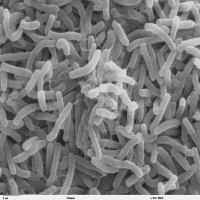 Smart Citations
Smart CitationsSee how this article has been cited at scite.ai
scite shows how a scientific paper has been cited by providing the context of the citation, a classification describing whether it supports, mentions, or contrasts the cited claim, and a label indicating in which section the citation was made.
Assessment of potential factors that support the endemicity of cholera in Nigeria from food handlers, health workers and the environment
Potential factors that support the endemicity of cholera in Nigeria
Background and Aims: Diarrheal diseases caused by bacterial pathogens are widespread and they result in morbidity and mortality of a lot of people yearly. The aim of this study was to assess the role of the environment, health workers and food handlers as reservoirs of Vibrio cholerae, and other diarrhea causing bacteria. Methods: Healthcare workers were proportionally selected and multistage sampling technique was adopted in selecting food handlers for the study. A total of 374 participants consisting of health workers and food handlers were recruited. Socio-demographic and clinical information were collected using questionnaires, while stool and environmental samples were also collected. Results: More female 55.9 % than male 44.1 % participated in the study and the mean age of participants was 38.7 ± 10.9. A significant number of participants identified poor hygiene practices as the major cause of diarrhea. V. cholerae O1 serotype was not detected in any of the environmental samples nor stool samples of both food handlers and health workers. However, V. cholerae (Non O1/Non O139) was isolated from the stool samples of food handlers and health workers in Kano State implying that they could be serving a source of the continuous dissemination of the pathogen. Other bacterial pathogens that are aetiology of diarrhea including Salmonella spp. Escherichia coli, Klebsiella oxytoca, and Enterobacter spp. were also isolated. Conclusion: It is therefore imperative that food handlers and health workers undergo periodic health checks to ensure they are free of pathogens they could easily transmit through food or to patients.
How to Cite
PAGEPress has chosen to apply the Creative Commons Attribution NonCommercial 4.0 International License (CC BY-NC 4.0) to all manuscripts to be published.

 https://doi.org/10.4081/mm.2021.10058
https://doi.org/10.4081/mm.2021.10058





